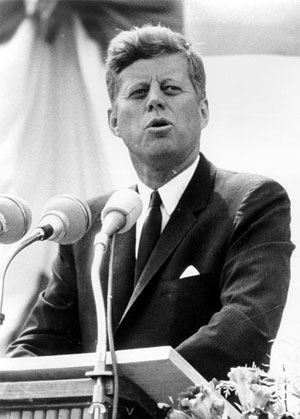
Gandhi, John F. Kennedy, Martin Luther King, Nelson Mandela – we all recognize the names. I believe that we can all pretty much agree that each of these famous individuals were fantastic speakers who helped all of us to improve our listening skills because we really wanted to hear what they had to say. But the real question is – why? What did they know about speaking that we need to learn? It turns out that there are two traits that all great speeches share.
Big Connections
All of the great speeches aren’t based on simple presentation tips – they involve big ideas. Ideas that are much bigger than the audience members that the ideas are being shared with. No small goals will do the trick here, we’ve got to think big! These are the speeches that show the importance of public speaking.
The speaker has two goals. First, they need to carefully lay out the big idea. There can’t be any fuzzy parts to this – everyone in the audience needs to feel as though they clearly understand what the speaker wants to accomplish.
Next, the speaker needs to find a way to connect each audience member to the big idea. He needs to find a way to transform the idea from being just any old idea into their idea – an idea that is owned by the audience. It’s very important that this be done in a way that makes the audience member believe that they have selected the idea themselves – they’ll be more committed to it this way.
K.I.S.S.
A lot of the challenges that are out there are big complex things. It can be all too easy for us as speakers to create complex solutions that require a lot of details in order to be accurately communicated to others.
However, if we do this, then we’ll lose our audience. Instead, we need to find a way to get our idea across simply – simple words, simple concepts. This can take a lot longer to come up with when you are writing your speech, but trust me – the results will make it well worth the effort!
What All Of This Means For You
We may never have the opportunity to move the hearts and minds of billions of people like Gandhi did. We also may never have an opportunity to rally a nation to a single purpose like John F. Kennedy did. However, as speakers we have an obligation to try to connect with our audiences like they did.
In order to accomplish this, our speeches need to share two traits with those of the most famous speeches. This means that they need to connect our audiences to an idea or purpose that is much larger than they are. Our speeches also have to be very simple – our audience needs to be able to relate to our words.
Taking the time to learn from the great speakers is what every speaker should do. It turns out that all of the great speeches share the same characteristics — that’s one of the benefits of public speaking. If we simply take the time to make our speeches more like the great speeches, then we’ll be that much closer to our ultimate goal – becoming unforgettable.
– Dr. Jim Anderson
Blue Elephant Consulting –
Your Source For Real World Public Speaking Skills™
Question For You: Where do you think the big concept should come from – do you make it up or should somebody provide it to you?
![]() Click here to get automatic updates when The Accidental Communicator Blog is updated.
Click here to get automatic updates when The Accidental Communicator Blog is updated.
P.S.: Free subscriptions to The Accidental Communicator Newsletter are now available. Subscribe now: Click Here!
Note: What we talked about are advanced speaking skills. If you are just starting out I highly recommend joining Toastmasters in order to get the benefits of public speaking. Look for a Toastmasters club to join in your home town by visiting the web site www.Toastmasters.org. Toastmasters is dedicated to helping their members to understand the importance of public speaking by developing listening skills and getting presentation tips. Toastmasters is how I got started speaking and it can help you also!
What We’ll Be Talking About Next Time
How’s that voice of yours doing? When you give a speech, how does your audience react? If they aren’t hanging on your every word, do you think that your voice could be having something to do with it?
